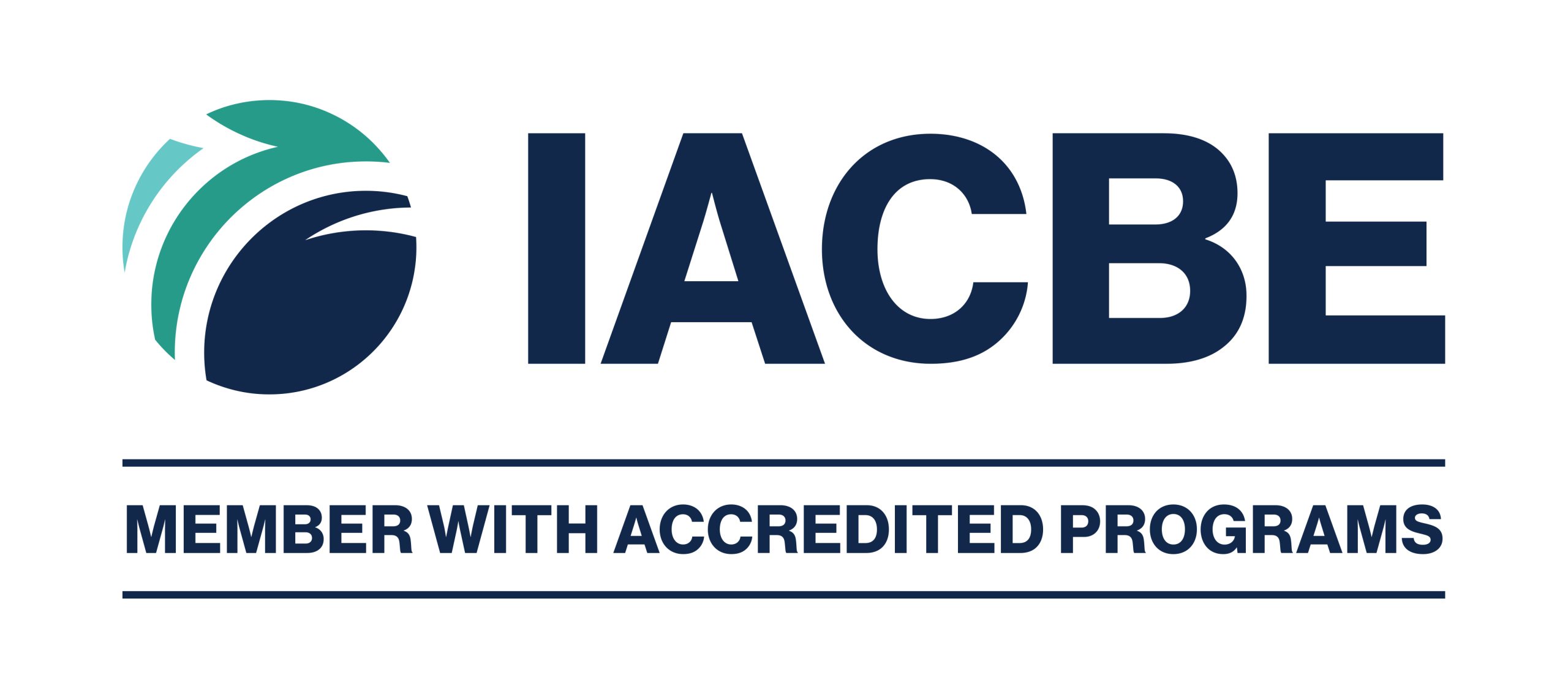Master of Business Administration – Information Management
Prepare to excel in the rapidly expanding field of business technology and management.
Technology is an integral part of every company’s operations. As an information manager, one could be called upon to act in a variety of positions such as coordinating a company’s implementation of new technologies, overseeing a firm’s information management strategies, or shaping the way a corporation operates in the e-Business sphere. The Master of Business Administration in Information Management will help prepare you to take on a leadership position in the IT field. This program aims to provide students with an education that will help them excel in the rapidly expanding field of business technology and management.
This well-balanced program teaches both business acumen and technological expertise. Graduate with a solid foundation in business organization and operation along with the insights and skills that are vital to a career in Information Management and business technology fields. Students will complete courses covering business finance, managerial accounting, business ethics, management of information systems, emerging technologies, and information systems strategic planning.
Graduate Capstone
Students are required to complete a capstone project. This individualized project allows students to apply knowledge and skills acquired in their courses and real-world experiences. It is designed to promote vital assets of learning integration, synthesis, and expertise in change management and leadership.
Enjoy Flexibility– 10 online courses with program start dates every 2 weeks
Choose Where You Learn– Online courses
Affordable Monthly Payments
Focus on Your Passion– Choose your capstone project
Why More Students Are Choosing Aspen


MBA Courses
Aspen’s MBA curriculum features 10 courses designed to equip you with advanced leadership and management skills. Taught by experienced educators from diverse industries, you’ll have the opportunity to apply new knowledge directly to your field through the integration of your MBA capstone project.
View the course schedule for this program: MBA Information Management Degree Plan
-
MGT500 - Management
-
BUS530 - Marketing Management
-
BUS560 - Business Ethics
-
BUS510 - Managerial Accounting
-
BUS550 - Business Finance
-
BUS540 - Managerial Economics
-
MGT645 - Project Management Essentials
-
CIS525 - Information Systems Strategic Planning
-
CIS545 - Emerging Technologies
-
BUS799 - Graduate Capstone
Management provides a solid foundation for facing the challenges of a rapidly changing and highly competitive business environment. This course introduces the fundamental management functions of planning, decision-making, organizing, leading, and controlling, as well as the tools and techniques of managing people, processes, projects, and the work environment. Students explore current issues in management and gain insights into how successful organizations operate.
3 CreditsRequired Books
This pulls together specialized models, tools, and processes from the perspective of the manager who is responsible implementing a coordinated marketing program. Because consumers and business buyers face an abundance of suppliers seeking to satisfy their every need, companies and not-for-profit organizations cannot survive today by simply doing a good job at marketing management. They must do an excellent job if they are to remain in the increasingly competitive global marketplace. Many studies have demonstrated that the key to profitable performance is knowing and satisfying target customers with competitively superior offers. This process takes place today in an increasingly global, technical, and competitive environment. Marketing management is the conscious effort to achieve desired exchange outcomes with target markets. The marketer's basic skill lies in influencing the level, timing, and composition of demand for a product, service, organization, place, person, idea or some form of information.
3 CreditsRequired Books
Today’s managers face many different opportunities to make decisions ethical and unethical as they compete with other firms. This course will provide an opportunity for managers to take business ethics seriously. That means taking the time to understand the core elements of the system that have gone awry and led to some extreme behaviors. Business ethics is primarily about business. This course will allow managers to get beyond the view of business as separate from ethics by allowing an opportunity to understand that business ethics is a fundamental of business management. This course begins by exploring the inherent values of future managers, how ethics is an integral aspect of an organization’s value-creation activities and aspirations.
3 CreditsRequired Books
Accounting, the language of business, provides crucial decision-making information to business organizations. This introduction to financial and managerial accounting prepares students to construct and interpret financial statements, generate budgets, and to use accounting data for strategic and management purposes with an emphasis on profitability. Legal and ethical issues in accounting are also discussed.
3 CreditsRequired Books
This course explores financial statement and cash flow analysis and the time value of money. It presents information on bonds and stock valuation and risk, return, and value. There are also discussions on capital budgeting processes and techniques, cash flow and capital budgeting, and cost of capital and project risk. Options and the international financial market are discussed as well.
3 CreditsRequired Books
Economics is the study of how resources are allocated. People of a nation and their government decide how much of a commodity should be produced and how that commodity is allocated. The allocation is done by a price system in free markets. There, prices determine how commodities are to be allocated, and prices determine how much should be made by a business. Microeconomics conveys the study of this allocation system to the level of an individual business. For over 200 years, business behavior has been carefully studied, conclusions made and tested, the models formulated and refined. Managerial Economics draws on the principles of economics and applies them to managerial decisions. It is incumbent on the student to be well versed in economic theories, models, and concepts so that their applications are pertinent, appropriate, and well-reasoned.
3 CreditsRequired Books
Introduction of the fundamental elements of effective project management and provides students with the opportunity to apply these elements using exercises and examples based on real-time projects. The tools and techniques used to plan, measure, and control projects, as well as the methods used to organize and manage projects, are also discussed. Focus is on developing project managers who can find the right people to do the right work at the right time, and for these people to make the right decisions. If you intend to certify as a Project Management Professional (PMP)®, initiate contact with the Project Management Institute at www.pmi.org and/or your local PMI® chapter.
3 CreditsRequired Books
A strong foundation for understanding what is meant by information technology and the business side of managing it, information technology in the context of organizations and their use of it. Focus is on business pressures and the strategies used to counter them, especially through the use of Web-based strategic information systems. Examination of electronic commerce applications related to the use of supply chain management to make products and services available for their customers, such as through Business to Consumer (B2C), Business to Business (B2B), Business to Employee (B2E), and Business to Government (B2G).
3 CreditsRequired Books
This course is designed to address the entire technology commercialization process, from idea to market. As technology drives innovation and companies seek more effective ways to exploit the intellectual property they create, it is important for students in business, engineering, and the sciences to understand the processes that result in successful new technology products in the market. This course is a comprehensive look at the issues related to the transfer and commercialization of new technology. High-tech businesses with patentable technology, whether engineering technology, biotechnology, or information systems technology, display different business models, processes, and characteristics from mainstream types of business.
3 CreditsRequired Books
The capstone project allows students to apply the knowledge and skills acquired in their courses to the work environment. This project is completely individualized; students are encouraged to select work-related projects that are of particular interest to them and that will result in professional growth and benefit the organization.
3 CreditsRequired Books
“The faculty is top-notch, and the instructors are some of the best. Their ability to link learning materials to things in your life to make that “connection” is vital for learning, and Aspen instructors in the School of Business and Technology have been amazing for me.”
David G.
MBA Project Management, graduated April 2024Cost & Time to Completion
The Best Fit for Working Adults
We understand the difficulties in pursuing your MBA when you have a demanding work schedule. The 8-week courses at Aspen University allow you to complete your program in as little as 2 years.
Our Monthly Payment Plan Makes Us Different.
Paying for your MBA shouldn’t be complicated. Our Monthly Payment Plan makes it easy for working nurses to finance their MBA program.
Tuition Rates
| $12,900 | Tuition |
| $2,025 | Fees |
| $1,500 |
Estimated
Textbook
Costs
|
| $16,425 | |
Other Ways to Finance Your MBA

Students who have served, or are currently serving in the United States Military and their legal spouses are eligible to receive a Military Affiliation Discount from Aspen University.

Aspen University is currently approved by the U.S. Department of Education to offer federal student aid for the MBA program.

Aspen University maintains employee tuition discount partnerships with a large and growing number of organizations. Tell your enrollment advisor where you work and ask them to check for you prior to enrolling.

Aspen offers several payment plans for students to fund their education.
Earn Your MBA with Confidence

The School of Business and Technology at Aspen University has received specialized accreditation for its business programs through the International Accreditation Council for Business Education (IACBE) located at 11960 Quivira Road in Overland Park, Kansas, USA. For a list of accredited programs please view our IACBE Member status page.
Clayton W.
MBA Information Management, graduated July 2021Admission Requirements

Application – A completed application; Aspen does not charge an application fee

Bachelor’s Degree – Official Transcript demonstrating a bachelor’s degree from an institution that is accredited by a CHEA recognized accrediting body or an international equivalent; applicants must have earned at least a 2.5 GPA in their bachelor’s program (see Catalog for more information)

Government-Issued Photo Identification – Identification must be valid, current, and legible.
Career Outlook
An MBA with an emphasis in Information Management from Aspen University prepares graduates to navigate and lead in the increasingly data-driven and technology-oriented business environment. This specialization equips professionals with the skills needed to manage information systems, drive digital transformation, and make strategic decisions based on data analytics and IT infrastructure management.
According to the Bureau of Labor Statistics, computer and information systems management employment is projected to grow 17 percent from 2023 to 2033, much faster than other occupations. This growth reflects the critical role that information systems and technology play in modern business operations.
Graduates of the MBA Information Management program at Aspen University will be well positioned to pursue leadership roles such as IT manager, chief information officer (CIO), data analyst, and cybersecurity manager, across industries like finance, healthcare, technology, and manufacturing. This program equips you with the strategic, analytical, and technical skills needed to excel in today’s technology-driven business landscape.
Average Annual Salary for Information Managers
$165,510
Data pulled from the Bureau of Labor Statistics in Fall 2024. Salary can vary widely depending on geographical location and role.
MBA Frequently Asked Questions
-
What is an MBA degree?
-
Is Aspen’s MBA program accredited?
-
Can I finish my MBA degree online?
-
What specialties are offered in the MBA degree program?
-
Can multiple specialties within the MBA program be completed simultaneously?
-
Does Aspen recommend any supplemental learning to support students completing the MBA program?
A Master of Business Administration degree is a graduate-level degree that prepares graduates for advanced leadership and management roles in busine
Yes, the MBA program is accredited by the International Accreditation Council for Business Education.
Yes, Aspen’s MBA degree programs are completed online.
Aspen offers MBA degrees specializing in Finance, Information Management, and Project Management.
No, students can only complete one specialization.
Students without a strong mathematics background are encouraged to check out MBA Math. The focus at MBA Math is on the basics, making efficient use of your time. With the greater confidence of a firmer quantitative foundation, you will be positioned well to take on the challenges of the MBA program! You work at your own pace, according to your particular needs, making use of the teaching materials as you wish.


